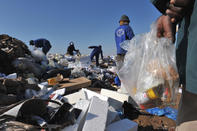Waiting for Waste
‘Mamba. That means “power”!’ says the Reverend Mandla Mamba, a voluptuous laugh barreling from his chest as he introduces himself, pushing out a puffy mitt in greeting. As it turns out, he is a good man to know, because the security at the Matsapha landfill, on the edge of the town’s industrial enclave, is not keen to allow any visitors in.

But the good reverend knows how to deal with bureaucracy. He is well connected, it turns out, and that always helps to open doors. Mamba drapes an arm over the shoulder of the site manager, lacing his fingers into the other man’s in that fraternal Swazi way, and explains why he needs to get through to the dump.
One quick phone call to a civil servant at the town board and Mamba’s party has the go-ahead to cross the weighbridge and head down to the tip below. Presiding over all this is a sign announcing the types of waste that can be offloaded here: general; industrial; garden; builders; ash; animal carcasses; condemned items; and recyclable materials.
‘Please use the weighbridge,’ it proclaims. The air around the exposed tip is almost liquid, it is so thick with the stink of putrefying organic matter. The closest description is that of overripe sweet cheese. A small group of men lounge about the edge of the dump site – some official looking, others scruffier. It is not apparent yet, but they are waiting.
Looking for Prize Materials
Three women have already started working the site, wading shin-deep through collapsing cardboard boxes and shattered Styrofoam, mangled plastic bags, wire, rope, soil, muck. And then it all happens. Across the way, where Mamba first sweet-talked his way past the boom, a truck rolls over the weighbridge, through the dip in the road and up towards the hillock of rubbish.
There is no mad scramble, no frenetic pushing to get to the front of the queue. These people have been scavenging the dump for months and they have established their own authority over the assets about to be tipped out of the skip. The skip is piled up with bags of watery lettuce and spinach, onions that are sending out shoots. Carrots, cabbages and vegetable peelings of some sort, all pressing up against the sides of the transparent bin bags.
Crumpled-up cardboard, discarded plastic wrapping, waste of indistinguishable origin. All of it tumbles out around the dozen or so people who pick their way through it, looking for prize materials. One man emerges with a clear plastic bag, still knotted at the neck, with easily 20-odd bottles of peeled and crushed garlic in brine and oil.
Another comes away with the onions. One woman, bent 90 degrees at the waist, tears open a bag from some point deeper in the hill of litter, something that was there before the skip arrives. Using four fingers, she spoons the contents directly into her mouth.
Underlying Competition
Mamba keeps a comfortable rapport going with some of them throughout. There is no shame or animosity at the reverend’s presence. One man flashes a grin and chirps something as he passes with a bag of loot. ‘He says it’s tight, man, there’s nothing today,’ Mamba translates.
But he senses there is a lot of competition underlying the nonchalant manner of the pickers. A newcomer who wanders into the fray to see if he can find a few bits and pieces for recycling, and maybe even a scrap of food or two, is hustled away with no uncertain threat that physical injury will come to him if he does not scoot.
These pickers have been working the site for some time now, an informal allegiance to one another giving them power to keep outsiders at bay. The interloper does not argue, plead or try to negotiate. He is just grateful to get away with a few tubs of expired garlic in oil, in spite of being threatened that if he does not drop those, he will be hurt.
Maybe it is the reverend’s presence that helps keep his demeanour so calm. But he nevertheless abandons his foray into the dump. If the mandate of the traffic controllers here at the site is to shoo away the scavengers, they are turning a blind eye today.
Each picker works his or her spot methodically, slowly, looking, looking, looking. Later, for sure, the site will be covered over with soil and compacted. But for now, the stinking mound might yet yield a few more scraps of food.
By Leonie Joubert